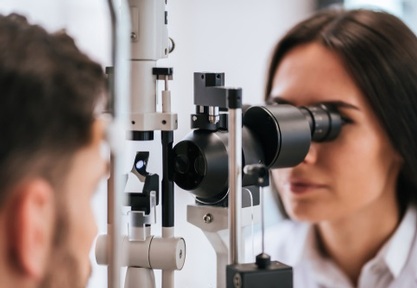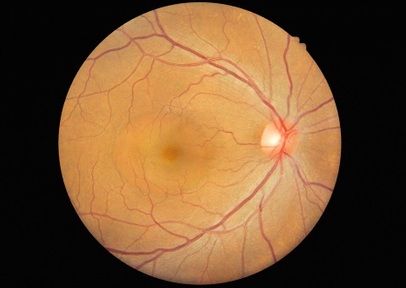Simple eye test could detect early signs of dementia
An eye test conducted by your high street optician could spot early signs of dementia, a new study reveals.

A UCL-led study has concluded thinner retinas in the human eye are a clear sign a person is at significant and increased risk of future cognitive decline.
Researchers at the UCL Institute of Ophthalmology and Moorfields Eye Hospital say their ‘breakthrough study’, suggests regular eye tests could identify those likely to get dementia at a much earlier stage, which means suitable treatments could be prescribed at a more effective time to stop the onset of dementia at an early stage.
Academics based their findings on an assessment 32,038 men and women aged between 40 to 69. Participants underwent optical coherence tomography (OCT) - used to measure the retina in particular the retinal nerve fibre layer (RNFL) - and found those with the thinnest RNFLs were more likely to fail basic cognitive tests for memory, reaction time and reasoning.
The OCT and cognitive tests were repeated three years later and revealed those with thinner RNFL were twice as likely to suffer cognitive decline.
The study published in JAMA Neurology concluded: ‘A thinner RNFL is associated with worse cognitive function in individuals without a neurodegenerative disease as well as greater likelihood of future cognitive decline.'
Co-lead author of the study, Professor Paul Foster from UCL Institute of Ophthalmology, said this is the first study to identify a thin RNFL indicates a risk of future cognitive decline.

“It is well known there are significant degenerative changes in the retina and optic nerves in established dementia,” he said.
“In carrying out this study our primary motivation was to determine if the RNFL and cognition relationship held true in the very earliest stages of cognitive decline.
"Our findings undoubtedly suggest that the retinal abnormalities, identifiable in established dementia, begin to manifest in the early stages of cognitive decline.”
Between 2002 and 2012, 99 per cent of clinical trials into treatments for Alzheimer’s disease failed.
In light of this, Professor Foster said: “It is likely that treatments will be more effective in slowing or stopping further at onset of dementia at earlier stages of the disease. Also, by targeting people in the earlier stages, it should be possible to design better clinical trials for treatments that make a real difference and improve people’s lives."
UCL Institute of Ophthalmology will now research the relationship between all layers of the retina, and cognitive function, and whether other eye or vision characteristics may be similarly related to cognitive decline.
Professor Foster added: “We believe optical coherence tomography measures of the retina will help identify those at highest risk of very early cognitive changes. This will, in turn, help to develop better clinical trials, and pull through new treatments more rapidly to patients.”
Dr Laura Phipps from Alzheimer's Research UK, said: "With future treatments for Alzheimer's and other dementias likely to be most effective when given early in the disease process, research into sensitive and non-invasive early markers of disease is vital.
"While a diagnosis of dementia will always rely on results from a number of different tests, further studies should look at how sensitive OCT could be at identifying those most at risk of cognitive decline in the general population."
.
Latest News
 29-Jul-24
Dementia Bus gives carehome.co.uk staff insight into life with dementia
29-Jul-24
Dementia Bus gives carehome.co.uk staff insight into life with dementia
 01-Mar-24
Find out the top care homes in 2024
01-Mar-24
Find out the top care homes in 2024
 21-Mar-23
UK's top care homes in 2023 revealed
21-Mar-23
UK's top care homes in 2023 revealed
 03-Jan-23
carehome.co.uk launches free care helpline
03-Jan-23
carehome.co.uk launches free care helpline
 13-Dec-22
5 mins with Emily Whitehurst, chief operating officer for Constantia Healthcare
13-Dec-22
5 mins with Emily Whitehurst, chief operating officer for Constantia Healthcare